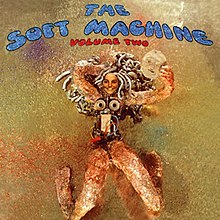Volume Two is the second LP by The Soft Machine, released in 1969. The album combined humour, dada, psychedelia and jazz. In 2000 it was voted number 715 in Colin Larkin's All Time Top 1000 Albums.[4]
| Volume Two | ||||
|---|---|---|---|---|
 | ||||
| Studio album by | ||||
| Released | September 1969[1] | |||
| Recorded | February–March 1969 at Olympic Studios, London | |||
| Length | 33:20 | |||
| Label | Probe SPB 1002 (UK); CPLP-4505 (US) | |||
| Producer | The Soft Machine | |||
| The Soft Machine chronology | ||||
| ||||
| Review scores | |
|---|---|
| Source | Rating |
| AllMusic | |
| Encyclopedia of Popular Music | |
Overview edit
The Soft Machine had split up in September 1968 but reunited that December without bassist/singer Kevin Ayers in order to fulfill contractual obligations. Their road manager Hugh Hopper took Ayers' place on bass and a second album (the first released in their home country UK) was recorded in early 1969. The group's sound had been radically altered from the first album, pushing much further in a complex prog and jazz-fusion direction with Hugh's brother Brian Hopper guesting on soprano and tenor saxophones. Multi-sectional suites like "Rivmic Melodies" and "Esther's Nose Job" rely on complex time signatures, Dadaist humour, short spoken word interludes, and Wyatt's idiosyncratic vocals which were often put through heavy echo delay. By contrast, "Dedicated To You But You Weren't Listening" is a brief melodic tune performed with an acoustic guitar.
In the lyrics to "Have You Ever Bean Green?" Soft Machine thank the Jimi Hendrix Experience, with whom they had just toured through the United States in 1968; as Hendrix's opening band they were exposed to large crowds for the first time. The title of this song is a play on the chorus lyric in the Hendrix song "Are You Experienced?", "Have you ever been experienced?". Wyatt thanks "Brian" (Brian Hopper) and "George" (engineer George Chkiantz) in the next section, Pataphysical Introduction – Pt. 2, which also includes a quote of "These Foolish Things". The title of the closing suite, "Esther's Nose Job", is derived from a chapter in Thomas Pynchon's novel V. After guesting on the album, Brian Hopper joined Soft Machine as a fourth member for a few months later in 1969.
While the highly uncommercial album failed to chart anywhere, a contemporary review in Melody Maker noted it was "little short of brilliant for much of its length". Retrospective reviews have also praised it as an early, important work in the progressive and Canterbury scenes.
Track listing edit
Side 1 edit
- "Rivmic Melodies" – 17:07
- "Pataphysical Introduction – Pt. 1" (Robert Wyatt) – 1:00
- "A Concise British Alphabet – Pt. 1" (Hugh Hopper, arr. Wyatt) – 0:10
- "Hibou, Anemone and Bear" (Mike Ratledge, Wyatt) – 5:58
- "A Concise British Alphabet – Pt. 2" (Hopper, arr. Wyatt) – 0:12
- "Hulloder" (Hopper, arr. Wyatt) – 0:52
- "Dada Was Here" (Hopper, arr. Wyatt) – 3:25
- "Thank You Pierrot Lunaire" (Hopper, arr. Wyatt) – 0:47
- "Have You Ever Bean Green?" (Hopper, arr. Wyatt) – 1:23
- "Pataphysical Introduction – Pt. 2" (Wyatt) – 0:50
- "Out of Tunes" (Ratledge, Hopper, Wyatt) – 2:30
Side 2 edit
- "As Long as He Lies Perfectly Still" (Ratledge, Wyatt) – 2:30
- "Dedicated to You But You Weren't Listening" (Hopper) – 2:30
- "Esther's Nose Job" – 11:13
- "Fire Engine Passing with Bells Clanging" (Ratledge) – 1:50
- "Pig" (Ratledge) – 2:08
- "Orange Skin Food" (Ratledge) – 1:52
- "A Door Opens and Closes" (Ratledge) – 1:09
- "10:30 Returns to the Bedroom" (Ratledge, Hopper, Wyatt) – 4:14
Personnel edit
- Soft Machine
- Mike Ratledge – piano, Lowrey Holiday De Luxe organ; Hammond organ (on 3); harpsichord (on 12); flute (on 3 and 10)[5]
- Hugh Hopper – bass guitar; acoustic guitar (on 12); alto saxophone (on 3 and 14–16)
- Robert Wyatt – drums, lead and backing vocals
- Additional personnel
- Brian Hopper – soprano and tenor saxophone
References edit
- ^ "Album Reviews" (PDF). Melody Maker. 25 October 1969. p. 29. Retrieved 15 September 2021.
- ^ Kurtz, Peter. "The Soft Machine - Volume Two (1969) album review, credits & releases | AllMusic". allmusic.com. Retrieved 25 July 2011.
- ^ Larkin, Colin (2007). Encyclopedia of Popular Music (5th ed.). Omnibus Press. ISBN 978-0857125958.
- ^ Larkin, Colin (2000). All Time Top 1000 Albums (3rd ed.). Virgin Books. p. 229. ISBN 0-7535-0493-6.
- ^ "Hugh Hopper - 1962-1972". Hulloder.nl. Retrieved 3 December 2011.